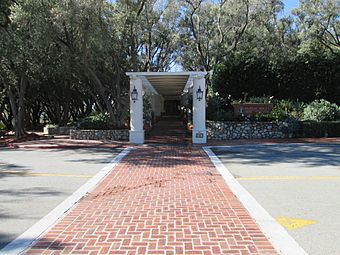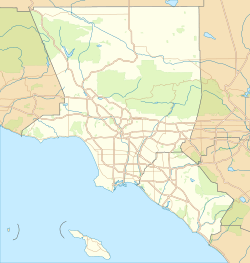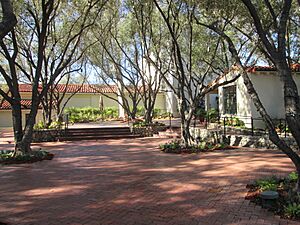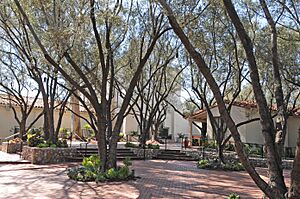Padua Hills Theatre facts for kids
Quick facts for kids |
|
|
Padua Hills Theatre
|
|

Entrance to the theater
|
|
| Location | 4467 Via Padova, Claremont, California |
|---|---|
| Area | 6.6 acres (2.7 ha) |
| Architect | Marston & Maybury; Storm & Manhoney |
| Architectural style | Mission/Spanish Revival |
| NRHP reference No. | 97001660 |
| Added to NRHP | January 23, 1998 |
The Padua Hills Theatre was a special place in Claremont, California, that showed plays and musicals about Mexican culture. It was open from 1931 to 1974, making it the longest-running theater of its kind in the United States. The theater worked as a non-profit group. Its main goal was to help people from different backgrounds understand each other better. This meant helping European Americans and people of Mexican heritage connect through art.
Contents
History of Padua Hills
Padua Hills started as a large area of land, about 2,000 acres. Bess Garner and Herman Garner managed this land. A part of it, about 6 acres, became an artist community. This community was called the Little Theater Association. It had a main dining room, art studios, shops, and a small theater.
The buildings were designed in the Spanish Revival style. They were located near the mountains in Claremont. The area was beautiful, with many trees and shrubs. The National Register of Historic Places described the complex. It included three buildings: a theater, a restaurant, an apartment, and a studio. These buildings were built around a central courtyard. The outdoor areas had olive trees and rock walls. There was also an outdoor stage. A special sign with Mexican folk dancers and a statue of an Indian maiden added to the unique feel of the place.
The Padua Institute, a non-profit group, ran the theater. This institute offered classes in Mexican folk music, dance, and Spanish. It was known for helping to keep the Spanish and Mexican history of early California alive.
The Unique Theatre Experience
The Padua Hills Theatre began as a small community theater. It first featured local actors called the Claremont Community Players. But during the Great Depression, it became famous for its "Mexican Players." These actors performed dinner theater shows. They presented plays, songs, and dances for audiences from 1931 to 1974. Even though the performances were in Spanish, most of the audience members were not Spanish speakers.
These shows were part of a bigger trend. This trend was called the "Spanish Fantasy Past." It was a way of remembering a romanticized version of California's history before American settlement. Other examples of this idea include the San Gabriel Mission Play and Olvera Street in Los Angeles. Helen Hunt Jackson's famous novel Ramona also showed this nostalgic view.
The plays at Padua Hills were special. They mixed this "pastoral pageantry" with "ethnic theater." The goal of ethnic theater was to teach people about Mexican, Spanish, and early Californian culture.
The Mexican Players (Paduanos)
The Mexican Players were the heart of the Padua experience. The Garners usually found these actors from the nearby Claremont area. Their main job was to entertain. However, they also helped with cooking, maintaining the property, and serving food.
After each show, there was a party called a jamaica. At these parties, the audience and the Paduanos (as the Mexican Players called themselves) could meet and have fun. The theater's main goal was to create "intercultural understanding." This meant helping Anglo-Americans and Mexican/Mexican-Americans connect.
While the institute tried to show Mexican culture in a good way, some people later criticized it. They felt it sometimes changed California history. They also thought it replaced old, negative ideas about Mexicans with new ones. These new ideas made Mexicans seem less politically active.
Despite these criticisms, the Paduanos found many good things from their time at Padua Hills. They discovered their talents and made strong friendships. Many also went on to successful careers in theater and other fields. Being part of the plays gave Latino/a actors a chance to share their artistic skills. There were not many other opportunities for them at that time.
For the wider community, the theater helped reduce negative feelings towards Mexican Americans, at least for a while. It also gave young Mexican Americans training in singing and dancing. This helped them advance in theater. Bess Garner worked closely with the players. She is remembered as a kind woman. However, some also recall that she could be very protective, like a mother. This was common for the time. She sometimes discouraged players from going to Hollywood. She could also be condescending to the young people living on the Padua grounds.
Famous Performers
- Natividad Vacío, a well-known film and television actor.
- Maximina Zuñiga
- Lilly & Manuel Aguilar of the Lilly Aguilar Dancers. Lilly Aguilar received a Pioneer Award for bringing Mexican folk dance to Los Angeles County.
Current Use of the Theatre
The Padua Hills Theatre closed its shows in the 1980s. Since then, the main dining room and grounds have been used for weddings and special events. Chantrelles Fine Catering, and later Padua Weddings, managed these events.
 | Janet Taylor Pickett |
 | Synthia Saint James |
 | Howardena Pindell |
 | Faith Ringgold |






